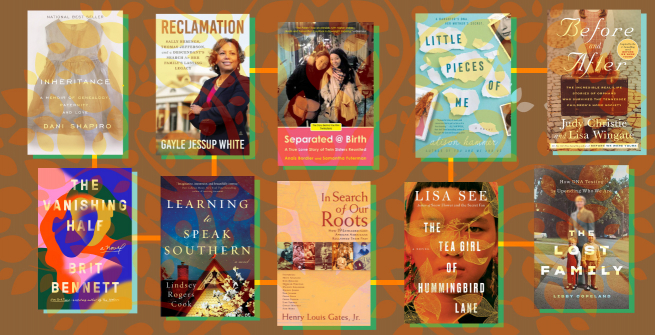Imagine discovering that the man who raised you is not your biological father. That your mother’s race differs from how she presented herself. That the person you are attracted to is your sibling. That you are the descendant of a renowned individual. A monstrous one.
Unknown details about blood relationships surface through DNA testing, genealogical research, an adoptee meeting a birth parent, or a confession made, perhaps after a loved one dies. Learning the truth triggers feelings ranging from betrayal to outrage over privileges denied, to joy at meeting new relatives, to a sense of peace in connecting to one’s heritage.
Novelists have the latitude to develop a backstory for family secrets, whereas historians and memoir writers generally don’t have access to such information. Are the fictional narratives about lineage less plausible? To decide, consider the following true stories.
From the 1920s up until 1950, the Tennessee Children’s Home Society in Memphis kidnapped thousands of mostly poor children to sell them in profitable illegal adoptions. This scandal is the basis for Lisa Wingate’s novel Before We Were Yours. Some surviving adoptees of the orphanage who read the book contacted Wingate who collaborated with Judy Christie to write Before and After: The Incredible Real-Life Stories of Orphans Who Survived the Tennessee Children’s Home Society.
Madeleine Albright was told that her family had moved from her native Czechoslovakia for political reasons. Two weeks after she was sworn in as the first female U.S. Secretary of State, the Washington Post reported that more than a dozen of her relatives, including three grandparents, had been killed as Jews during the Holocaust. Albright writes about this astonishing discovery in Prague Winter: A Personal Story of Remembrance and War, 1937-1948.
Anais Bordier, an adoptee born in Busan, South Korea, and raised in France, saw on social media a video of someone who looked just like her. The other woman, Samantha Futerman, also born in Busan but raised by her adoptive parents in New Jersey, turned out to be her twin. They tell their story in Separated @ Birth: A True Love Story of Twin Sisters Reunited.
One of the most enduring family identity sagas pertains to the descendants of U.S. President and author of the Declaration of Independence, Thomas Jefferson. After his wife, Martha, died, Jefferson and his slave, Sally Hemings, had four children who survived to adulthood. Denial about Jefferson being the father persisted in some circles for more than two centuries. Two of Heming’s four children who entered white society were even forbidden to divulge their father’s identity as a condition for being freed from slavery. Finally, in 1998, DNA testing confirmed the biological relationships.
African Americans who descend from slaves are usually unable to ascertain the name of the country where their ancestors were born. Records of that information weren’t kept, and genetic data does not go back enough generations to reflect the time in history when Africans were taken as slaves to America. Los Angeles Times columnist Sandy Banks wrote in 2019 of the “excitement, wonder, pain and pride” she felt upon learning from a DNA test that she was 24% Nigerian. Two years later, however, she was informed that due to a reinterpretation of data, while she was still 46% African, she was only 1% Nigerian.

























